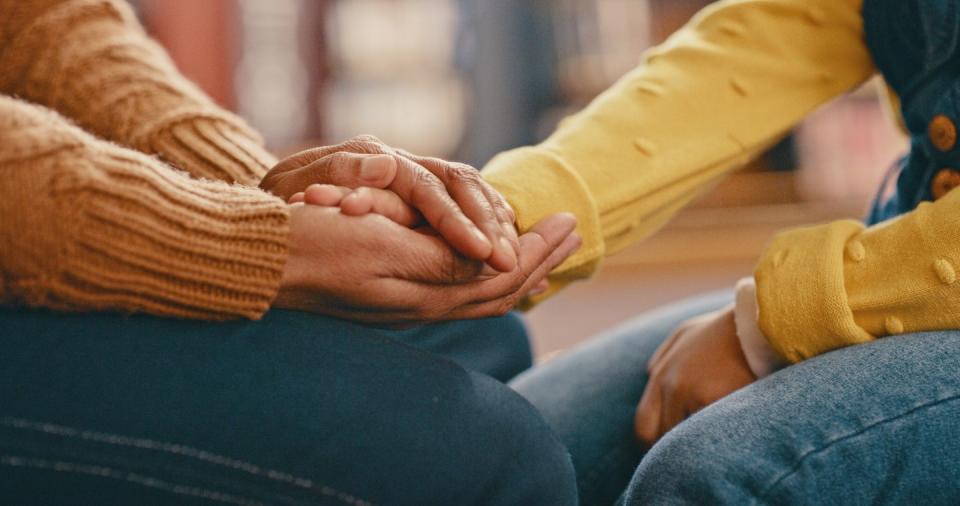The 10 signs of unresolved grief

Unresolved grief can present in many different ways, from overactivity to oversleeping, and everyone's experience with grief will look different.
However, no matter what stage you are in the grieving process right now, know that you are not alone and there is help available. You can talk to your GP to learn more about support in your local area, or check out the NHS' guidance on getting help after bereavement, grief or loss.
To help you learn more about unresolved grief and the most common signs to look out for, plus how to work through it, we spoke to the experts.
What is unresolved grief?
"Unresolved grief is a persistent and distressing emotional response to a significant loss that remains unprocessed and unintegrated in our lives," explains Chance Marshall, therapist and co-founder of Self Space. "When we experience unresolved grief we might find ourselves stuck in the grieving process, unable to integrate the loss and continue living fully."
Lianna Champ, who has over 40 years of experience in grief and bereavement counselling and is the author of practical guide, How to Grieve Like A Champ, adds: "Unresolved grief is like trying to drive a car with the handbrake on – we will only be able to function at a certain level."
If grief is not honoured and recognised, it can have a negative impact on your physical and emotional wellbeing and manifest itself in many ways.

Unresolved grief: 10 common signs that you haven't grieved properly
You don’t want to speak about or acknowledge the loss and avoid it.
Overactivity – you are either working too hard or spending too much time on a hobby to distract yourself.
You have started to isolate and detach yourself from family and friends.
You are indulging in bad habits – over or under eating; drinking too much alcohol; risky behaviour etc.
You are sleeping more than usual.
You are overreacting to a relatively small event.
You avoid getting close to people and starting new relationships for fear of being hurt.
You feel intense longing for the deceased and difficulty accepting the loss.
You experience feelings of guilt or anger that disrupt your daily life.
You experience physical symptoms such as fatigue, changes in appetite, headaches or poor sleep.
What is the impact of unresolved grief?
If you do not allow yourself to grieve, it can impact your life in many ways. "If grief is not honoured for a long period of time, it may lead to prolonged states of depression, anxiety disorders, substance abuse, and chronic health issues," Chance explains. "It can also strain relationships, impair work performance, and diminish overall quality of life."
It doesn't matter how much time passes, you will still feel the impact of unresolved grief. "If you don’t do anything to reconcile your losses, the pain still remains and will be as strong as ever. If you have been surprised by your reaction to a lesser loss, it may be a sign that you have unresolved grief from previous losses," Lianna adds.
Is it possible to have resolved grief?
"Completely resolved grief is a myth," Chance tells us. "We never truly, fully resolve the death of people we love, but our task with all grief is to make space for processing and observing; that is all we can do."
Lianna adds: "Healthy grief is what we experience when we allow ourselves to feel the pain of our loss." When we can identify and understand what we are feeling, and over time come to accept what has happened, we are able to continue living our normal lives and able to experience happiness, even though the pain of the loss never goes away completely.

How to work through grief
"We can’t think ourselves through grief, we have to experience it," Lianna tells us. Instead of telling yourself you are ok or expecting yourself to feel better in a set period of time, you need to work through your grief with the help and support of others and allow yourself to feel the pain of your loss.
Reach out for support - "Talk to trusted friends, family members, and mental health professionals for support," Chance says. "We have over 20 grief specialists available at Self Space, with no waiting list."
Connect with others - Your family and friends may not understand what you are going through, so it's important to connect with people having a similar experience. "Communities like the The Grief Gang are brilliant," Chance tells us. The podcast and mentorship set up by Amber Jeffrey is on a mission to normalise grief.
Write your feelings down - Sometimes it's easier to write down how you are feeling that say it aloud. "Be honest with yourself. Sometimes we feel guilty if we missed an opportunity to say, or do, something and this can keep us stuck in a loop so write it all down," advises Lianna.
Begin to address the loss with support - "In therapy, the first step we would take is noticing and observing: so notice if you are grieving," says Chance. "One model I like when it comes to framing grief is 'Growing Around Grief'. It challenges the idea that ‘time heals all wounds’ or that ‘grief disappears with time' and instead that, over time, your grief will stay much the same, but your life will begin to grow around it."
Be kind to yourself - "It is much easier to bear your sadness if you aren’t also berating yourself for being sad," says Lianna. "We live in a society that seeks easy and instant results to everything, so it's important that we learn the benefits and beauty of patience, effort and perseverance when we experience emotional trauma."
Remember that grief evolves - Grief is unpredictable and it will evolve with time. "Not only do we grieve at the time of our losses, but also as we enter new stages and milestones in our lives," Lianna explains. "Accept that we will always have those moments of sadness and let that be OK."
How to support someone through grief
If you are supporting a loved one through unresolved grief, then empathy, compassion and practical help is key.

"Knowing the right thing to say to someone who us grieving doesn’t come naturally to most of us," says Chance. "But, sometimes you don’t need to say anything. When it comes to helping someone who is grieving, you do not need to make it better. The most basic and powerful way to support another person in grief is to listen. Just listen."
You can can also support them by checking in on them, cooking their meals, helping them with cleaning, sending them therapy recommendations or driving them to their sessions.
What to say to someone who is grieving
If you're struggling to know what to say to a loved one who is grieving, Chance suggests trying to connect with them through the below prompts:
If you or anyone you know is experiencing unresolved grief, there is help available. Reach out to a medical professional for support, check out the NHS website for information on services available, or visit Self Space and try their Therapist Matching service for specific grief-related support.
You Might Also Like



